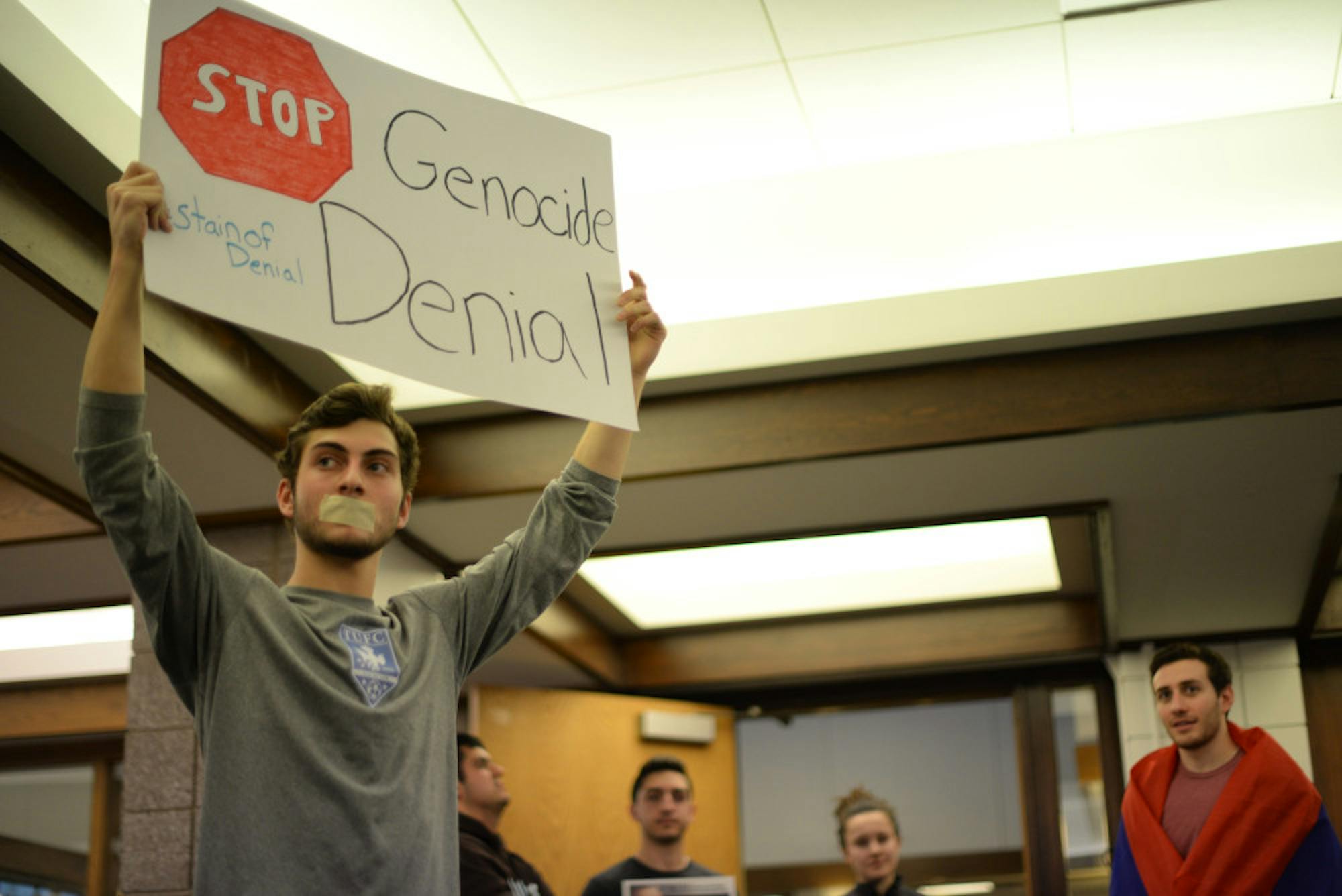Several protestors from the Tufts Armenian Club participated in a national "Stain of Denial" protest in the Mayer Campus Center yesterday afternoon to urge recognition of the Armenian Genocide.
During the two-hour long protest, students displayed posters with expressions such as "Stop Genocide Denial" and "Recognize the Genocide." The protestors also distributed information sheets describing the genocide while playing Armenian music and speaking about the historical context of the genocide, which was carried out by the Ottoman government during and after World War I.
Ari Kazanjian, a leader in the Tufts Armenian Club, said that at least 50 people stopped to observe the demonstration, many of whom stopped to speak with protestors about the genocide.
Sophomore Nairi Krafian said that the protestors were also joined by many members of the Armenian community from the Greater Boston area. Fifteen Tavitian scholars who came from Armenia to study at the Fletcher School of Law and Diplomacy were also present, along with University Special Event Coordinator Tamar Kanarian, she said.
While the protest was planned to be a silent protest in order to make a bold statement, only Armenian Club member ShantMahrokhian kept tape covering his mouth for the duration of the event, so that the other protestors could engage in conversation with passersby, Krafian, one of the protest organizers, said.
“We decided not to have everyone [protest silently] because this for us isn’t as much about making a statement as it is about informing people,” Krafian, a sophomore, said.
According to Mahrokhian, the demonstration coincided with several similar protests on university campuses across the country. The national "Stain of Denial" protest was organized by the All-Armenian Student Association (ASA), which serves as the umbrella organization for Armenian student groups in universities across the country, according to the organization's website. The Armenian Youth Federation (AYF), the Armenian Revolutionary Federation (ARF), Shant Student Association, the Alpha Gamma Alpha sorority and the Alpha Epsilon Omega fraternity co-sponsored the national protest, according to All-ASA Chair Mikael Matossian.
Matossian explained that the national protest has three main areas of focus: educating students about the history of the genocide, raising awareness about consequences of the genocide and inspiring students to take action against genocide denial by taking action through student government.
According to Krafian, the Tufts Armenian Club primarily focused on the first two goals with its protest, emphasizing the importance of education on this topic.
“The big goal [was] for us to get people to know what happened, what [the genocide] was and to get people uncomfortable with the fact that our country is denying it,” Krafian said.
Mahrokhian also echoed this sentiment, explaining the importance of awareness about the genocide.
“Denial is kind of the final step of a genocide,” Mahrokhian,a sophomore, said. “This is the first step of bringing those that are responsible to justice because a lot of people aren't aware.”
Matossian explained that this was the first time that the Armenian Club had participated in this protest event, as the fourth annual "Stain of Genocide" protest became a national event this year for the first time and expanded beyond its roots in universities on the West Coast.
Kazanjian, a junior, said all-ASA wanted to make a collective statement outside of the month of April, when the genocide is typically commemorated because April 24, 1915 is recognized by the Armenian government as Armenian Genocide Remembrance Day.
"One of the main purposes of this campaign is to stress that genocide denial happens year-round, and it's not something that should be fought [against] for one day, but year-round," Kazanjian said.
As part of the national protest, the individual Armenian student groups across the country used the same basic structure for their events, according to Matossian.
“This year, we are really trying to make a push for consistent messaging across the board, in contrast to each ASA doing their own thing...we really wanted to have a strong collective voice that's visible on social media and online,” he said.
Matossian said that there was a conscious effort to maintain a large social media presence about the protest, in order to raise additional awareness about the atrocities of the genocide, which helps to hold the conflicts’ perpetrators accountable for their actions. In 2014, protesters were able to get #ArmenianGenocide trending on Twitter, he said.
Krafian said that, while the Armenian genocide did not occur in recent history, she feels that it is still crucial for the genocide’s perpetrators to be condemned.
“A lot of people will say 'why do you still care' because it was so long ago, but genocides have happened after this, and it's setting a precedent for the people committing these crimes that it's okay to do this and you won't get in trouble and no one will hold you accountable for it,” she said.
Tufts Armenian Club participates in national protest against denial of Armenian Genocide

The Tufts Armenian Club hosted an action in the Campus Center for the annual worldwide "Stain of Denial" silent protest against the Armenian Genocide on Feb. 4, 2016.





